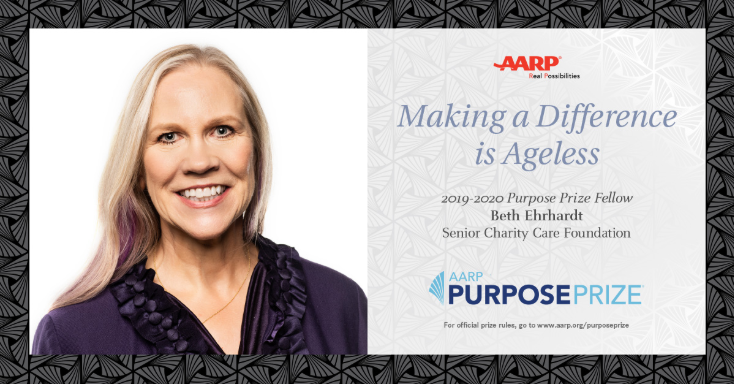AARP Hearing Center

In January 2012, at the age of 56, I became the second president of the Senior Charity Care Foundation (SCCF) in Salt Lake City, Utah. In 2011, we were able to assist only two seniors struggling to pay basic health expenses. In 2018, we served 806, and in 2019 we plan to help 1,500.
The problem I’m trying to solve
Nearly 7 percent of all adults age 60 and over in Utah live below the federal poverty level. These older adults struggle to pay basic out-of-pocket medical expenses for hearing aids, eyeglasses and dental care. There are very few resources for them, and Medicare and Medicaid fail to meet the needs. As a result, they often suffer from preventable tooth and mouth pain as well as the loss of eyesight and hearing abilities. SCCF works to provide affordable vision, hearing and dental care for seniors over 55 who reside in care facilities or senior apartments. We operate our own mobile dental clinics that go right to these seniors’ residences, and work with local audiologists to obtain hearing aids, with patients paying between 20 and 30 percent of the total costs. We contract with local providers, who serve our seniors at a reduced rate, and even provide some of the services ourselves to save significant costs.
The moment that sparked my passion
After living with me for several years, my aging mother, who suffered from dementia and blindness due to macular degeneration, was placed in a care facility, in 2007. She did much better when I visited her daily, so I started the practice of stopping by after work around dinnertime. I noticed that most of the residents had difficulty seeing, eating and hearing. When I asked staff about it, I was surprised to learn that it was because the residents couldn’t afford new eyeglasses, hearing aids or dental care. Our family was fortunate in that we literally sold the family farm to care for my mother so that she didn’t have to go without anything. It was so upsetting to me that these seniors weren’t getting the care they needed and deserved.
My mom died in 2008, and three years later, I lost my job as the chief development officer for a social services agency. In the midst of my employment search, I discovered that there was an opening for the position of president at an eight-month-old nonprofit, the Senior Charity Care Foundation. I remembered those assisted living facility residents pushing food around their trays because they couldn’t see it, or sipping food made into pureed drinks because that was the only way they could eat. It seemed a godsend to pay it forward to those who desperately deserved excellent medical care.
Advice to others who want to make a difference
If you have an idea for a nonprofit, investigate it and see if another organization is working to fill that niche. If you find something that’s similar but not exactly what you want to start, reach out to them. It’s easier to become involved with them to find mutual goals than to create a whole new program. As I started working with the Senior Charity Care Foundation, I saw that there was room for improvement. Rather than spend $5,000 on one senior’s dental care, I wanted to see if we could take that same amount of money and spend it on more seniors. We changed our focus from helping seniors by sending them to providers with whom we had negotiated discounted rates to taking services to them through mobile dental care. Mobile services take away the barriers of transportation; the lack of knowledge of the importance of good oral, vision and auditory health; and motivation or fears.
Why my approach is unique
While there are for-profit providers that will travel to senior care settings to provide dental, vision and auditory care, they serve only those people who can afford their charges. We, however, subsidize the majority of the cost in order to reach all seniors who are medically underserved. While we do ask patients to pay a portion of the costs, we’ve structured that on a sliding-fee scale. We’re able to subsidize this in part because we contract with providers directly who are often willing to waive or reduce their rates.
Another innovative aspect is that our teams of dentists, hygienists, optometrists and opticians are trained in geriatric care, so they treat seniors with dignity and respect while ensuring that their needs are met. One recent example: when Dr. Clark, one of our dentists, was asked to provide care to a patient who was bedridden and mute, he brought his equipment directly to her room and knelt down and explained to her that if she wanted him to help her, all she needed to do was squeeze his hand. Rather than just forcing this woman to passively accept care, he empowered her to make her own decision. We added mobile vision services in August 2019 and will include mobile audiology care in our menu of services later this year.
Also of Interest































































